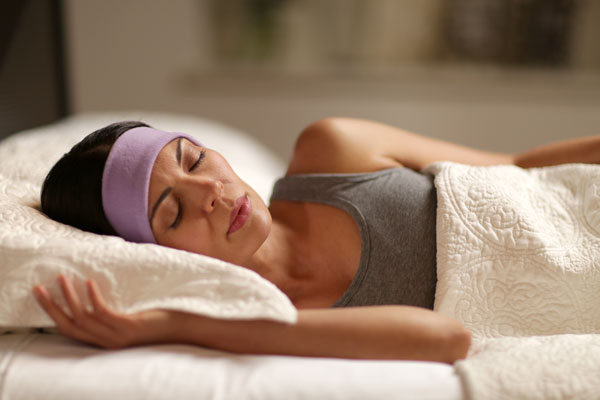What to Know About Sleeping on Your Side

Is sleeping on your side your preferred sleep position? If so, you're in good company because about 74% of people report that they sleep on their side.
From the best side to sleep on to dealing with side sleeping shoulder pain, you may have some questions about side sleeping. Here are answers to some of the most common side sleeping questions.
Are there benefits to sleeping on your side?
Yes, there are! Side sleeping lets your spine relax into its natural position with the right pillow supports, which helps keep neck and back pain at bay. You're also less likely to snore if you sleep on your side, making it the proper sleep position if you suffer from sleep apnea.
What's more, research on animals suggests that sleeping on your side helps clear waste from your brain better than sleeping on your stomach or back. This could ultimately help prevent Alzheimer's disease or Parkinson's disease.
Are there disadvantages to sleeping on your side?
Unfortunately, there are. Side sleepers can suffer from arm numbness and shoulder pain. (Read below to learn more about side sleeping shoulder pain.) Side sleeping can also put pressure on the stomach and lungs and lead to wrinkles since your face is in constant contact with your pillow. If you notice any pain or are looking to prevent wrinkles, it's best to not fall asleep on your side every night.
What is the best side to sleep on?
For most people, it doesn't really matter. One notable exception is pregnant women— they should sleep on their left side to promote good circulation and keep the growing uterus from putting pressure on major blood vessels. There are even large body pillows designed to support the side sleeping, which is very important in the third trimester.
What's the best side to sleep on for digestion?
That would be your left side. When you side sleep this way, the angle of your esophagus to your stomach is increased, which helps to keep the stomach acid in the stomach, where it belongs. You would also have less heartburn by elevating your head and not eating for at least three hours before you go to bed.
Do I need a side sleeping pillow?
Not necessarily, but some side sleepers prefer fuller pillows for support. A popular option is contoured memory foam because it alleviates pressure points in the neck and shoulder. There are many pillows marketed to side sleepers— like anything, it's best to read reviews online and test them out in stores before purchasing one if possible. Having a pillow between your knees and ankles also help with ensuring proper spine to hip alignment, which becomes more important as you age.
What should I do if I get side sleeping shoulder pain?
Shoulder pain from side sleeping often results from the pressure that's put on the tendons surrounding your shoulder. Sleeping on the side of a rotator cuff problem can aggravate it, so avoid that side until the rotator cuff issue resolves. Help prevent shoulder pain from side sleeping by experimenting with different pillows; placing a pillow between your knees when you sleep; and investing in a quality mattress that gives you the right support. Some people also find that wearing an arm sling to bed provides relief.
What if I get side sleeping back pain?
Side sleeping back pain is often caused by a mattress that lacks support. So start by investing in a quality mattress that properly supports your body. In general, heavier people need firmer mattresses. It's also a good idea to alternate which side you sleep on or to try sleeping on your back at least a few nights a week. A pillow placed between your knees and ankles can also help alleviate side sleeping lower back pain.
What else can help me side sleep in comfort?
Besides a quality mattress, pillow, and linens, you might also consider SleepPhones® headphones. These "pajamas for your ears" contain flat speakers in a soft, stretchy headband. They let you listen to soothing music, audio books, white noise, or anything that relaxes you while you're in bed. Unlike earbuds that tend to dig into your ears and cause pain or typical headphones that slip off, SleepPhones stay on and have thin yet powerful speakers. This includes while you're resting or sleeping on your side!
